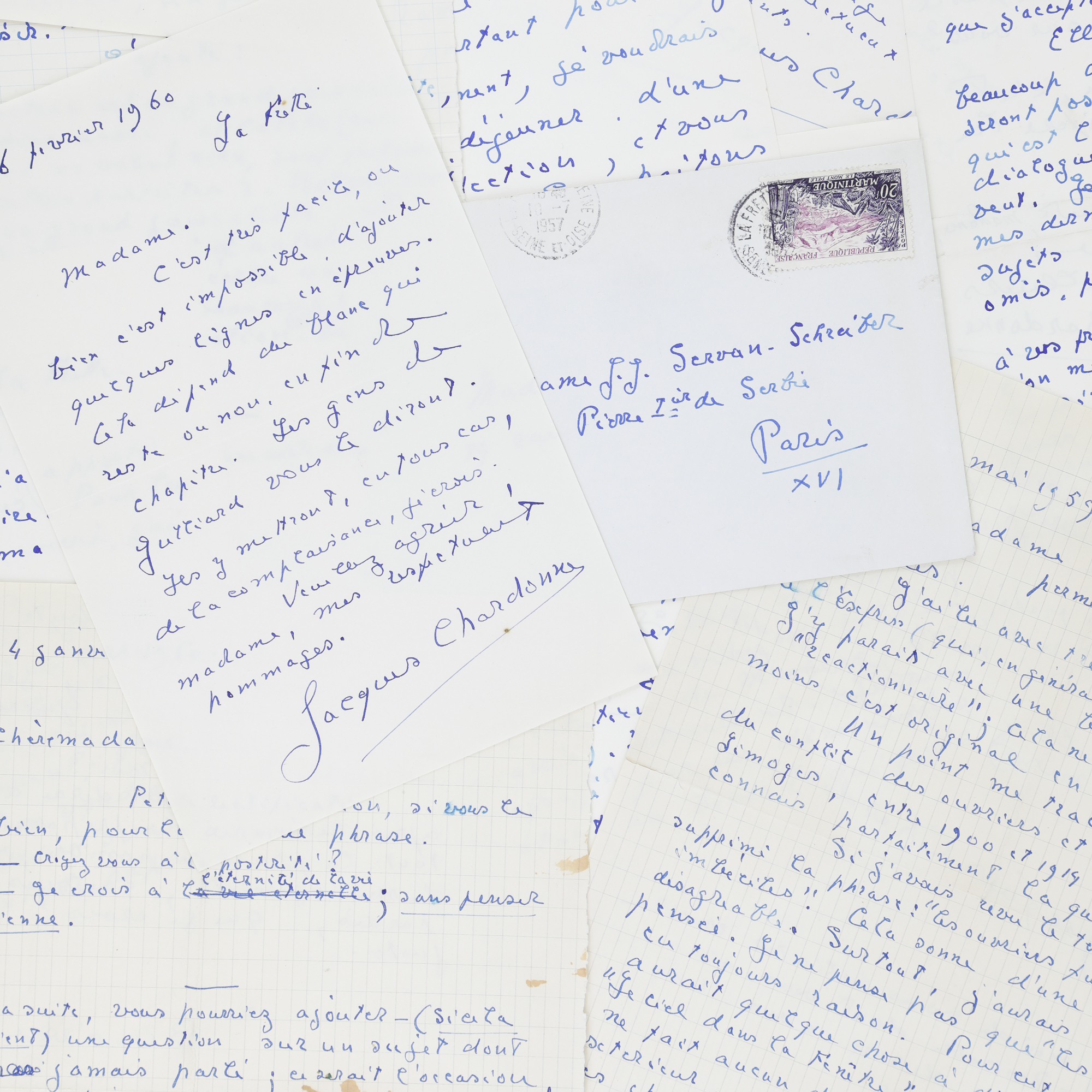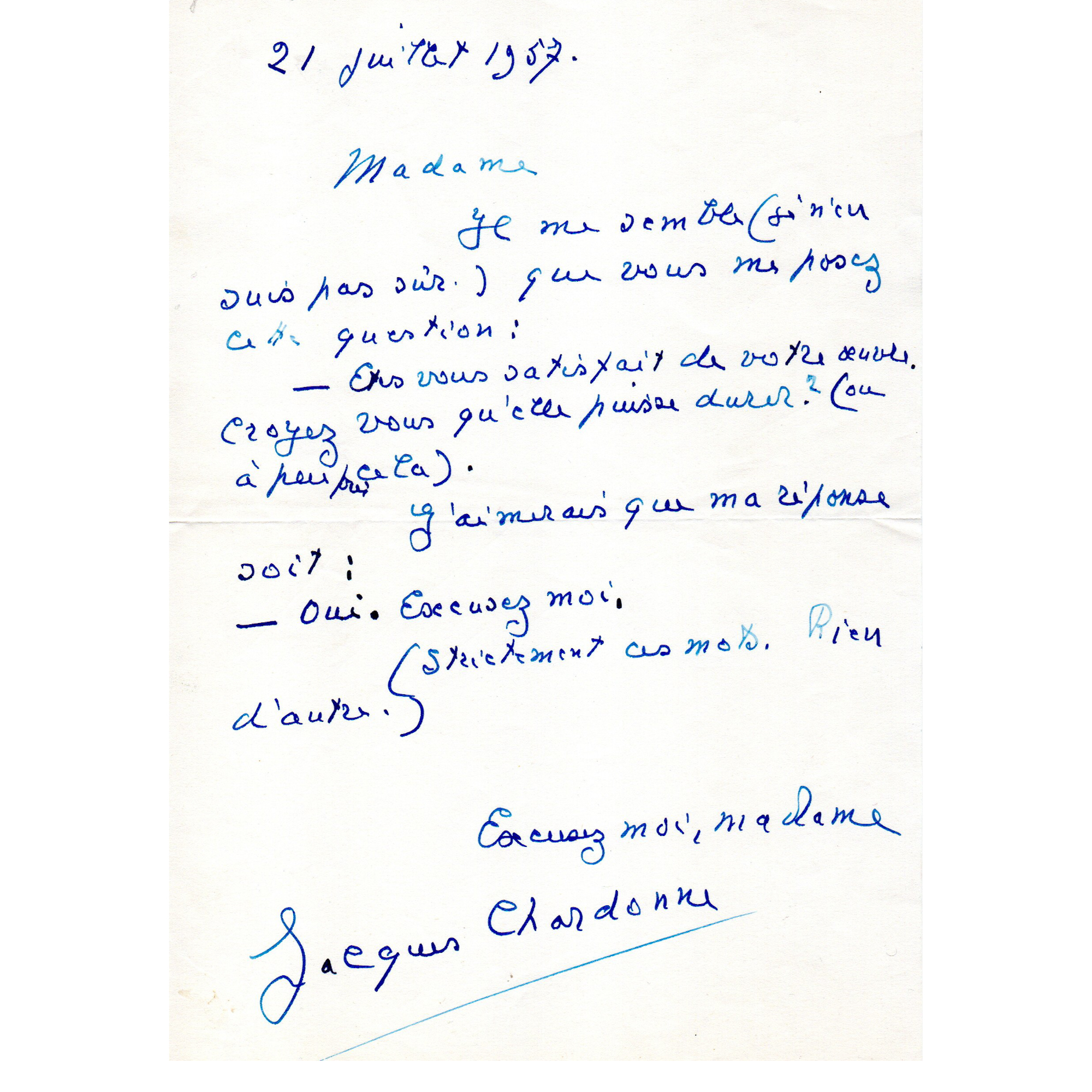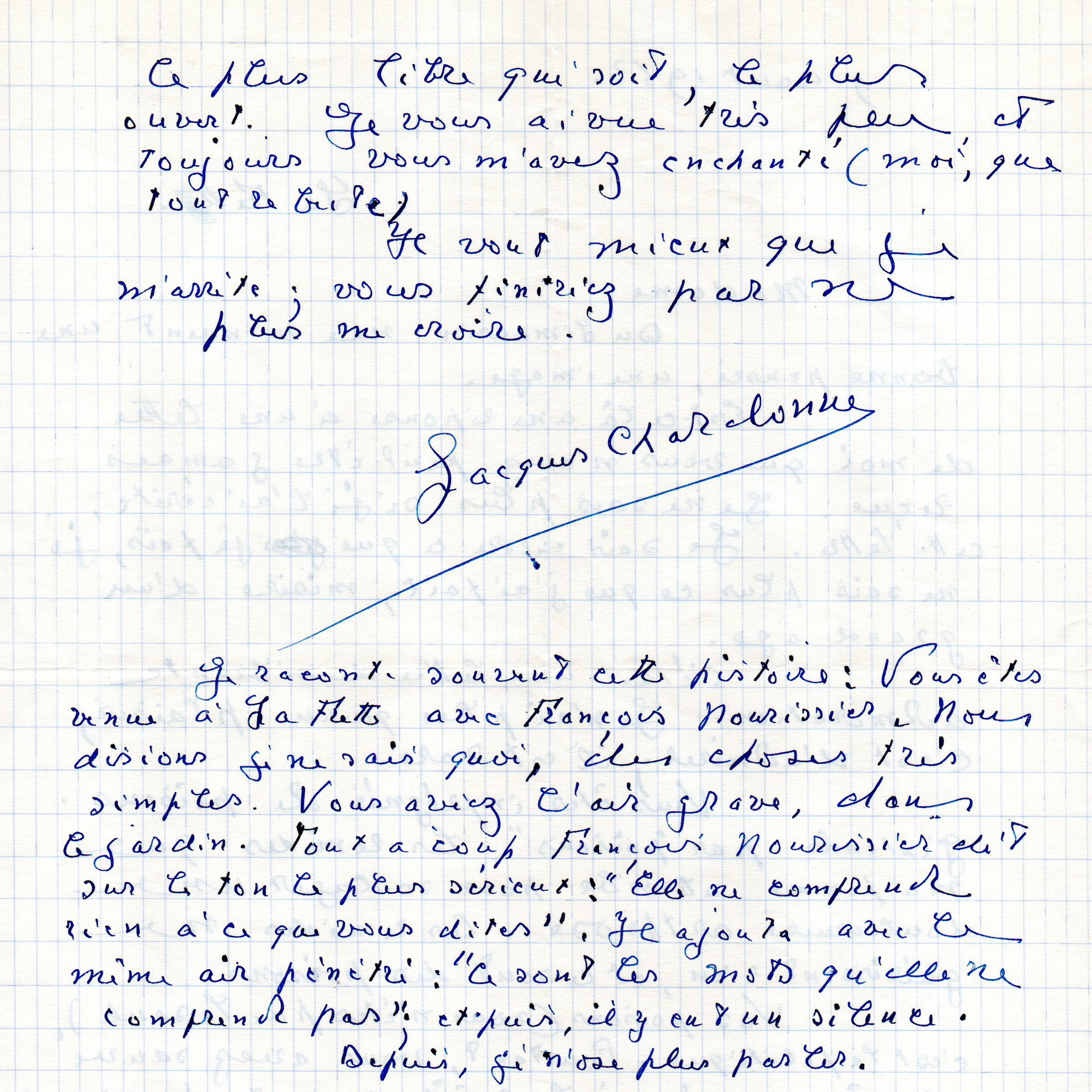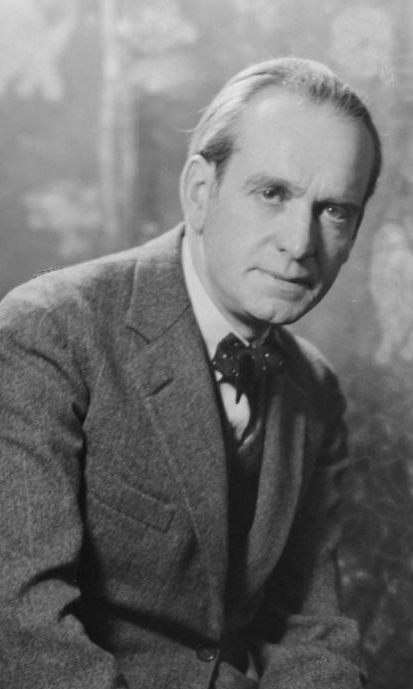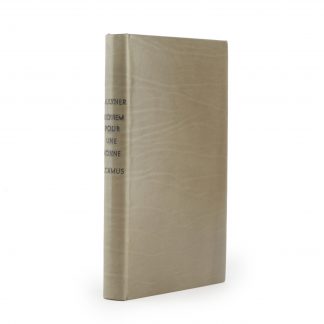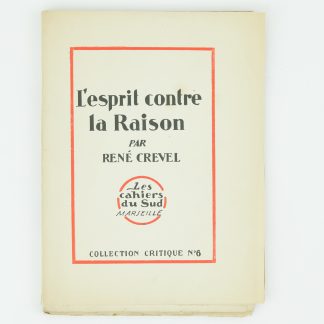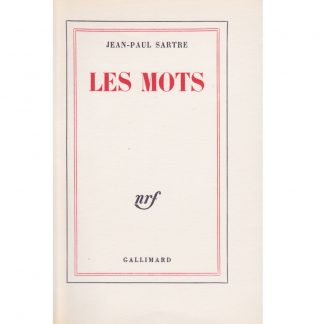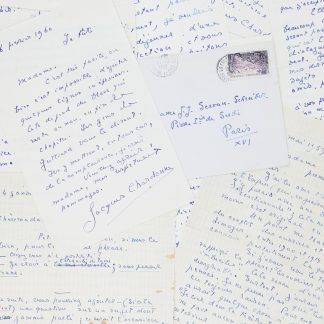Description
Beautiful correspondence in 20 signed autograph letters addressed to Madeleine Chapsal between March 1956 and August 1963. Centred around an interview published in L'Express in May 1959, this exchange testifies to the meticulous - even maniacal - care that Chardonne took over the smallest element of his work.
The journalist Madeleine Chapsal, in her memoirs published under the title Send the Little MusicIt was on the advice of Roger Nimier, an admirer of Chardonne's talent as a stylist, that Chapsal offered her an interview - despite the fact that, by her own admission, she found the writer "a bit of a flop".as sleepy as the Charente, which flowed not far from his fiefdom".
On 25 June 1957, Chardonne enthusiastically accepted:
It's the "questioner" who is the imagination in this dialogue. He will take me where he wants. [...] If it's not contrary to your principles, I'd like to be given at least the main questions a few days in advance. You always need a little time to think. Then I'll speak, and the impromptu will have its share. I won't make many corrections.
It was an impromptu event, which in fact caused him some anxiety. Two days before the interview, he wrote:
I'm frightened by the dimensions, being a talker who says everything in two words. [...] Given the circumstances, we could inaugurate the elliptical dialogue, in just a few pages (10 July 1957)
The event took place at Madeleine Chapsal's home, in the presence of Roger Nimier. The journalist set about "gently teased the old reactionary who, like a pachyderm used to this kind of fly, wagged his ears and tail, but nothing more."The conversation continued, however, punctuated by formulas that Chapsal suspected had been ".polite[s] in advance".
L'Express delayed publication of the article: during July, Madeleine Chapsal received a flood of letters in which Chardonne kept coming back to the interview, changing, subtracting and adding:
I gave a vague answer to a question about happiness in Barbezieux. Roger Nimier has the text of the correct answer. I wrote two new paragraphs to which I added a great deal of importance. I think Nimier has sent you these new texts. I beg you to insert these new versions (changes of detail) and to cancel the first ones (18 July 1957).
I'd like to add a few words to a passage that you'll find easily. This supplement, which is short, seems interesting to me. [This supplement is attached to the letter] (21 July 1957)
It seems to me (I'm not sure) that you're asking me this question:
- Are you satisfied with your work? Do you think it will last? (or something like that).
I'd like my answer to be:
- Yes. Excuse me.
(Strictly these words. Nothing else)
(July 21, again)"I think I said that my nanny was widowed at the age of 22, with two children. It should read "she was a very young widow with two children"... Let's be exact; we read the Express in Barbezieux" (22 July 1957)
If you agree, these last words, please, following the last sentence of the dialogue:
"Dying calmly is enough. You have accepted everything. You can't ask for more" (23 July 1957)
Chardonne does not hesitate to use sycophancy to get these corrections accepted:
[on Chapsal's portrait of Arland in L'Express] for these two pages of L'Express I would give all the 'literature' of the day. It's just that it always needs to be 'translated'" (15 July).
"When you offer a passing guest such refined cold chicken, you have the taste of kindness. I appeal to the best in you" (18 July)
But the writer's missives were so numerous that Chapsal began to "take a dislike to Chardonne's writing [which she] spotted from a distance". This does not prevent him from recognising the value of these corrections, which reveal the full extent of his stylistic work:
Obsessive, manic, and I would even say ridiculous, if each of the changes he proposed to me did not reveal his art of form, his concern for perfect expression, and did not bring an undeniable improvement to our common work.
On 27 May 1959, almost two years later, L'Express finally published the interview: the day after publication, Chardonne declared himself satisfied:
It's a curious sensation to read a text by yourself that you don't know, to hear your voice that you've never heard. [Chapsal emphasises the irony of this in his memoirs] I was apprehensive. Now I'm reassured. It's lively, often funny." (28 May 1959)
But neither Chapsal nor Chardonne had reached the end of their tether: even though the paper was already on the newsstands, the writer went back to work!
"I read with some trepidation the conversation in the Express (which, in general, was very amusing). I appear in it with a nice 'reactionary' face; that doesn't bother me; at least it's original in these times.
One point bothers me. What I say about the conflict between workers and employers in Limoges between 1900 and 1914 is true. I know the issue inside out.
If I'd gone over the text again, I'd have deleted the line "workers are idiots". It has an unpleasant ring to it (30 May 1959).
A few friendly letters followed. An invitation:
"we'll go to Switzerland for a week, to see the little Chinese girl (she's actually Chinese, which is better for her) that Josette Solvoy has brought back from Tahiti, and we'll do the Roscott experiment (sea bathing in a bathtub filled with seaweed) (10 July 1959).
A curious message translated and typescripted by Chardonne for an anonymous "friend":
"Madeleine Chapsal] seems to carry within her the very drama of France. Do you know the drama of France? It's a country that has been so wrapped up in itself plus what it thinks; or rather (and this is serious) why it thinks that" (30 July 1959)
Then, in January 1960, Madeleine Chapsal planned to publish a collection of his literary interviews with Julliard. Chardonne was quick to respond:
"Afterwards, you can add (if you like) a question on a subject I've never talked about; it would be the first opportunity to do so. (4 January 1960)
"It's very easy, or impossible, to add a few lines in proofs." (16 February 1960)
"I would like the mayor of La Frette to be able to see that a sentence that upset the people of La Flette (in our conversation published in the Express) has been deleted from your book. I would have deleted it if I had read the first interview" (12 April 1960).
"This is how"notes Chapsal, "that Jacques Chardonne began to write to me and continued to do so for many years...". A final letter, dated 9 August 1963, bears witness to the curious affection the writer had come to develop for the journalist:
You're full of poisons. By 'poisons' I mean the remedies my wife takes to relieve painful osteoarthritis. These remedies cure nothing, and they are poisons. Your poisons (and you're not the only one) are politics. And yet you have saved your soul, preserved your taste, which is the finest and most reliable taste I know. [...] I often tell this story: you came to La Frette with François Nourissier. We were saying I don't know what, very simple things. Suddenly François Nourissier said in the most serious tone: "She doesn't understand a word you're saying. He added with the same penetrating air: "It's the words she doesn't understand"; and then there was silence. Since then, I don't dare speak."

